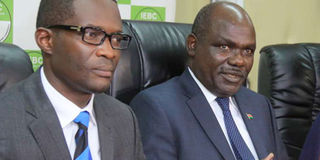New ballot tender will delay election: IEBC

Independent Electoral and Boundaries Commission Chairman Wafula Chebukati (center), flanked by the chief executive Ezra Chiloba, speaks during a press conference on July 14, 2017. Al-Ghurair is printing the ballot papers for the other elective seats. PHOTO | JEFF ANGOTE | NATION MEDIA GROUP
What you need to know:
- Mr Karori said that even with another direct procurement, IEBC will still be required to comply with the law.
The The Independent Electoral and Boundaries Commission on Friday said court orders issued last week nullifying the tender to print presidential ballot papers may stall the elections scheduled for August 8.
The agency’s lawyer, Mr Kamau Karori, told the Court of Appeal that it requires more than a month to carry out a fresh tender.
PROCUREMENT
The Appellate judges are Erastus Githinji, Roselyn Nambuye, Alnashir Visram, Otieno Odek and Jamila Mohammed.
Mr Karori said that even with another direct procurement, IEBC will still be required to comply with the law, which includes among other things:
preparing tender documents, negotiating with the printer, carrying out due diligence, allowing the printer time to study the contract, and time to acquire appropriate papers, which is a minimum of 50 days.
“We don’t have that time. There was material before High Court to show it will be impossible to commence the process as ordered by court and still be able to hold elections on August 8,” he said.
PARTICIPATION
Three High Court judges nullified the tender awarded to Al Ghurair Printing and Publishing LLC, saying there was no public participation.
IEBC was directed to come up with a mechanism for public participation.
The firm is however printing the ballot papers for the other elective seats.
PRINTING
Mr Karori further argued that IEBC, in a meeting with all the eight presidential candidates, had set out the measures it had put in place to mitigate the risks that may occur in production of ballot papers.
The commission allowed a delegation of politicians, civil society, media, representative from religious groups, and registrar of political parties, to monitor the printing in Dubai.
However, Nasa lawyer James Orengo said the Constitution allows for public participation.
Lawyer Paul Muite for IEBC added that public participation can also be through elected leaders.




